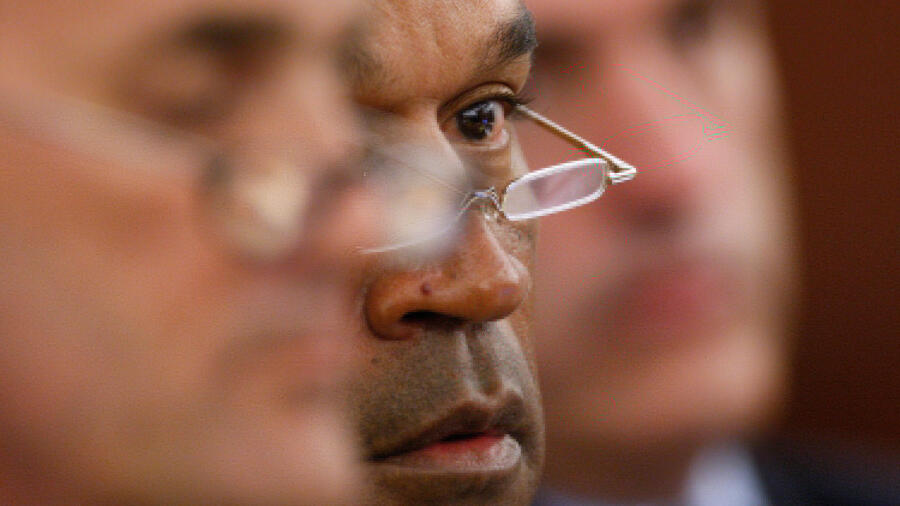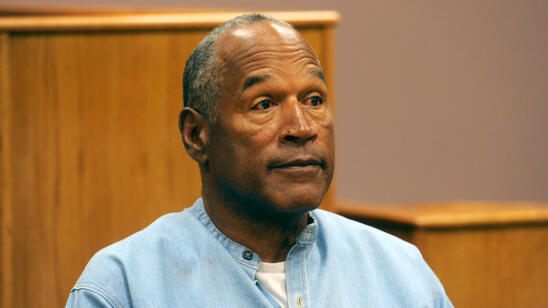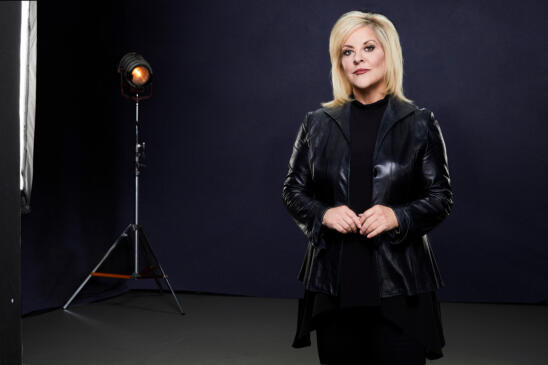In July 20, 2017, Orenthal James “O.J.” Simpson, who was convicted of robbery and kidnapping in 2008, will go before the Nevada Board of Parole in Carson City. Public interest around O.J. has remained high since his 1994 criminal trial for the murders of ex-wife Nicole Brown Simpson and Ronald Goldman, in which he was found not guilty. Over the last few years there have been a number of TV shows and documentaries about the former football star’s fall from grace: O.J. Made in America, O.J. Speaks: The Hidden Tapes, The People vs. O.J. Simpson: American Crime Story, as well as the just-announced A&E documentary, Guilty: The Conviction of O.J. Simpson (w.t.), premiering in October. National interest still remains high and the outcome of his parole hearing will no doubt be the subject of much debate on social media and elsewhere.
With the help of Jesse Jannetta, senior associate researcher at the Justice Policy Center of the Urban Institute, a nonprofit research group focusing on economic and social policies, we break down what will likely happen at O.J.’s parole hearing: the process, the major players and what we know will happen in the end.
The charges (12 of them, including armed robbery and kidnapping) stemmed from a confrontation he had in a Las Vegas hotel room with two memorabilia collectors over items O.J. claimed were personal keepsakes that had been stolen from him. O.J., who was convicted in 2008, is serving several sentences both concurrently and consecutively. He did have an earlier hearing (in 2013; watch it here) to consider his parole for sentences that only required five years to be served before eligibility. He did receive parole on these, but began immediately serving the next consecutive sentence. The remaining sentences together required at least four years served before eligibility, making him eligible for parole on October 1, 2017.
If parole is denied, a new hearing date will be set. Generally, these are one to three years from the inmate’s parole eligibility date.
Watch: In Part One of two videos, Alison Becker talks about the early lives of Lyle and Erik Menendez and the circumstances of their parents’ murder. If parole is granted, Simpson will get a same-day decision, although he will not leave prison before October 1, 2017.
Parole hearings in Nevada are open to the public. In this case, massive media attention is expected, so journalists who can’t fit in the room can view the hearing via video conference. Members of the public can watch the hearing live on ESPN. Testimony is limited to the inmate, and a representative, victims of the crime for which parole is being considered and one family member or supporter of the inmate. Victims who attend are not required to testify.
What are the factors that the parole board base its decision on?
Nevada has an 11-item parole-risk assessment [which rates factors on a scale that it uses to gauge the likelihood of reoffending. [Factors include age at time of offense, current age, employment history, prior offenses, history of drug/alcohol abuse, gender, disciplinary conduct, among others.] The concept of these assessments is that a jurisdiction will look at the data they have locally on people being considered for parole to see how they do, and how these factors are predictive of who is or isn’t likely to re-offend.
How likely is it to get paroled at a first hearing? (Given that O.J. received parole for some of charges in 2013.)
It isn’t necessarily a slam-dunk and many people who see a parole board don’t receive parole the first time. Nevada makes publicly available their worksheet and parole guidelines so you can see pretty transparently what would likely happen depending on the risk level and severity of offense. You do have cases where the presumption is that people would get paroled at their first eligibility—if their risk to re-offend is low and the severity of the offense is low.
The board also has on the form aggravating and mitigating factors to consider [such as prior violent conviction, crime history, good behavior in prison, and level of involvement in the convicted offense]. It puts in one place the things that the board is considering and how they weigh them.
[Editor’s note: the 11 points are evaluated and awarded mostly on a scale from -1 to 2 (though some offer just two choices) and are divided into static and dynamic factors. For example, gender is static: Since women are less likely to re-offend, a woman gets a 0 and a man gets 1 point. Active gang membership, a dynamic offense, is either 0 (none or suspected) or 2 (member or associate). Since older inmates are less likely to re-offend, being age 41 or over gets you a -1 (also on the dynamic list). Low risk is less than 5 points, medium is 6-11, and high is 12 or over or 8 points of dynamic factors.]
How does someone qualify to be a commissioner on a parole board?
Parole board members are generally—and they are in Nevada—gubernatorial appointees with 4-year terms. The required qualifications vary across the U.S. quite a bit. They are paid positions. You have people serving on parole boards who are prominent business people but don’t necessarily have any particular, specialized knowledge of criminal justice prior to becoming parole board members.
In Nevada, they’ve got the chair and six commissioners, for a total of seven members. Their bios are online, and everybody on their board has either had law enforcement, correctional or behavioral health experience. So, at a base level, all the Nevada parole commissioners have some degree of past work experience or specialized knowledge that would be relevant for considering folks for parole. That wouldn’t necessarily be true across country.
Do you think the parole board’s decision-making could be swayed by O.J.’s past fame and/or notoriety or, possibly, a feeling that O.J. escaped justice in the past?
It’s hard to say. His fame and various travails are widely known in this case. It would be very strange to have somebody on the board who isn’t aware of that. When you look at the release parole guidelines worksheet in terms of aggravating factors, they specify whether or not you have prior violent convictions or repetitive similar criminal conduct. But, of course, the case for which O.J. is most notorious did not result in a conviction; it resulted in an acquittal.
I think there’s a question around notoriety—whether or not that’s something that’s legitimate to consider. Would the notoriety bear on any public-safety risk? When you look at what factors are on paper, there’s nothing that speaks specifically to this sort of case. The other factor is that, with the notoriety, the scrutiny you may have as a decision maker about him is greater than in a typical case.
This is why there is value in doing structured, assessment-based, informed decision-making according to their full guidelines. It’s about getting consistency in the decision-making to make sure that only the factors that are fair, legal and appropriate are considered. You can never completely do that, because part of the reason you have a parole board is so you can have human decision-making be a part of it. But part of what you’re trying to do with some of these tools is guide that.
Is it like being a juror on a high-profile case?
The big difference is that if you’re empaneled on a jury, that’s likely to only happen once or maybe a few times in your life. If you’re a parole commissioner, you have to make decisions multiple times on high-level and important public-safety questions, such as whether or not someone should get discretionary release from prison.
If an offender got out and re-offended, they might feel responsible?
That’s inherently just part of the job when you are a parole board member, and that’s a possibility in any case. I think we’ve got good tools for predicting risk of re-offending, but nothing can predict the future. Part of what you have to do is balance the information that you have and think about what you are trying to do for public safety. The flip side is that if parole boards never let anyone out of prison, then very quickly the prisons would become overcrowded…and you’d start to have operations and public-safety impact. Part of the responsibility of being a parole board member is thinking how to balance those things.
Is it true that there is a better or worse time to have your parole hearing?
There was a study where they found that the parole board was more punitive right before lunch than right after lunch. I think we all know that when we’re tired or hungry, we tend to make decisions differently. This does come back in my mind to the assessment framework that you have. What you are trying to do with structured decision-making and reasonably objective risk assessment is standardize and set that level. We’ve said, ‘We have this tool, and we trust it. Is it predictive?’ That’s where we’re starting from. By having this more objective structure for your starting point, you mitigate the way in which fatigue, or other things, might impact decision-making.
Famously, O.J. did flee from law enforcement [in 1994 after being asked to surrender in connection with the murders of Nicole Brown Simpson and Ronald Goldman]. Is that situation irrelevant because, while it was high-profile, it had nothing to do with a convicted case?
That would not figure in, as far as I can see, any of the points in the risk-assessment instrument. But when you look at the aggravating or mitigating factors, that might be something they would consider—whether you had fled in past. Often, what you think of in a system of justice is: ‘Did you show up for court?’ Or, ‘Did you try and flee when you were under justice supervision or had a court case pending?’ [The Bronco chase] is such a famous thing, but then he went home and ultimately turned himself in. In what way, formally, would that be considered fleeing? Did he miss a court date? Did he flee while he was under any kind of community supervision? That would be the question.
Does getting parole mean you are just sailing out the door, or are there usually conditions?
When you are released, you’re generally going to be under parole conditions. You’re going to be meeting with your parole officer in the community. You’ll be under community supervision. One of reasons why you might want to consider granting parole is because, if you don’t parole somebody, they will be in prison longer. When they complete the entirety of their term—when they max out, so to speak—they’re generally getting out of prison with no supervision at all. So when we think of risk mitigation, if they are under parole supervision, you are able to see how they are doing in the community and minimize their risk factors.
Generally, an inmate has a parole-release plan. This provides a proposal for the board to okay where you would be living. That’s something the board looks at very seriously. Is it a home situation that’s going to be conducive to not re-offending? Nevada may have halfway houses and things like that as options. There is also the possibility that, when you’re incarcerated in one state, it’s possible to go back to another if you are from there. There is interstate contact.
Is this parole-release plan part of the parole hearing?
That is something the board is going to be looking at when making a decision.
Do the victims testify at a parole hearing?
There’s often opportunity for victim representation, and that’s usually about the offense for which you were serving the prison term.
Does the inmate testify?
The inmate has the opportunity to make a statement.
Is it instant decision?
You’re generally going to have a decision in the hearing.
Do you think it’s important for an inmate to seem like they have reformed and repent their actions?
It’s not just about repentance, though that could be an important part of it. If you have the ideal situation, as people come to prison, the parole board would work with the correction agency to do an assessment on the drivers of criminal conduct. Is it substance abuse? Is it criminal thinking? Is it who they were hanging out with? They would identify the things the inmate needs to work on. Then, programmatically, they’d work to reduce risk. (Participation in programs is one of the mitigating factors considered in parole hearings.) The parole board can then ask the question, ‘Have you put in the work?’
For example, if substance-abuse issues are part of what brought you to prison, have you engaged in programs in prison? That puts the onus on the prison system to have that treatment. That’s the accountability piece of this—that you can motivate people with the possibility of parole release. There’s a program where inmates can put in the work to really address their issues, and that work is then recognized. That’s different than repentance, a different kind of accountability. That’s more fact-based. Because it’s one thing to say in a parole hearing that you have changed or intend to change, but it is another to have demonstrated this by engaging in months of programming directed at this goal.
For a list of websites that will be live streaming the parole hearing, visit the Nevada Board of Parole Commissioners website.
(Image: Justin Sullivan/Getty Images)



